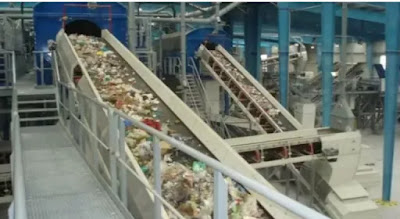Filenews 18 February 2025 - by Angelos Nicolaou
The competent authorities are proceeding with the introduction of a landfill tax for municipal waste, with the aim of only residual waste ending up in landfills by 2035 and not exceeding 10%.
In this context, relevant regulations are under public consultation by the Department of Environment until 24/02/2025, regulating the imposition of a tax on the final disposal of municipal waste in landfills. Specifically, the disposal of municipal waste in landfills will be taxed by €35/tonne upon approval of the relevant regulations by Parliament on municipal waste for households and businesses and will continue to increase by €5/tonne per year, reaching a maximum of €70/tonne. The aim is to end this tax once burial is reduced to 10%.
The tax revenues will be used for local municipal waste management actions and thus will contribute efficiently and financially support the relevant efforts of local authorities for more efficient management with benefit to citizens.
With the entry into force of the regulations, a tax is imposed on the quantities of municipal waste disposed of in municipal waste landfills, with immediate effect, while the ideal scenario is to implement it at the same time as "Pay As You Throw".
It should be noted that the final level of the tax is sufficiently high to act as an incentive to encourage recycling and the implementation of alternative waste disposal methods, such as the separation of organic waste.
Under the Landfill Directive, waste suitable for recycling will not be accepted in a landfill. Essentially, if implemented, the target of reducing waste landfilled from 59.1% of total municipal waste in 2022 to 10% in 2035 will be achieved. This surcharge will be paid by local authorities and will inevitably be passed on to consumers.
According to the Department for the Environment, a landfill tax is the most common economic instrument used across the EU to improve municipal waste management, with 22 out of 27 member states implementing it. Five Member States do not apply the relevant legislation and are Cyprus, Malta, Croatia, Luxembourg and Germany. Most countries in the EU-27 apply the Pay As You Fly (PDO) system at the same time as the landfill tax. Only 7 states do not apply the PDO. These are Greece, Bulgaria, Poland, Latvia, Malta, Portugal and Cyprus.
According to the Department of Environment, the PDO is implemented in conjunction with the landfill tax and therefore complements and reinforces the effort to separate collection and reduce waste going to landfill. It is noted that there are also member states that impose a combustion tax.
It is noted that the Ministry of Finance, through the provision of technical support by the EU Structural Reform Support Service, prepared a study for the implementation of the green tax reform, which is a commitment under the National Recovery and Resilience Plan. Part of the green tax reform is the introduction of a landfill tax/fee for municipal waste by legislation, with a milestone of completion of the reform by 30/6/2026. According to the study, the landfill tax will be imposed on all waste ending up in landfills, without exemptions, on a tax rolling scale, as follows: initial cost €35/tonne, annual increase €5/tonne and maximum tax €70/tonne.
The aim of this policy is to provide an economic disincentive to landfill waste and to promote waste prevention, reduction and reuse actions as well as separate collection actions aimed at increasing recycling.
The PDO system is an economic tool for the separate collection and diversion/avoidance of waste to landfill as part of circular economy actions.
It is noted that this tax is a measure of the Municipal Waste Management Strategy, which was approved by the Council of Ministers in July 2022, with a timetable for its implementation in 2025.
According to the regulations, with the entry into force of these regulations and until the end of 2025, the disposal of municipal waste in landfills will be taxed at a rate of €35 per ton of municipal waste disposed of in the landfill. With the beginning of the second calendar year of application of these Regulations, i.e. from 1/1/2026, the disposal of municipal waste in landfills will be taxed at a rate that will increase per year by €5 per ton of municipal waste disposed of in the landfill, with a maximum rate of €70 per ton of municipal waste.
Concern about failure to meet waste recycling and reuse targets
Cyprus faces serious challenges in achieving the targets set for the recycling and reuse of municipal waste, while, at the same time, it does not seem to be making enough progress in reducing landfilling by 2035. This concern is compounded by the fact that the landfill rate remains close to 60%, with the country ranking at the bottom in the European Union in terms of municipal waste recycling.
According to the Environmental Policy Implementation Review Report 2023, which is a tool to monitor the implementation of environmental legislation in the EU, one of the main priorities is the introduction and gradual increase of taxes on landfill of waste. The aim of this policy is to completely phase out landfilling of recyclable and recoverable waste. The implementation of these measures is crucial for achieving the EU's waste management objectives.
This concern is reinforced by the 2023 Early Warning Report, which identifies Cyprus' over-reliance on landfilling as one of the main risks to the country's environmental policy. In the same report, the need to develop a separate waste collection system across the country, with a focus on organic waste, is highlighted. At the same time, it is recommended to raise public awareness on waste sorting and waste prevention.
In addition, the Commission proposes to implement economic measures to promote proper waste management, such as the pay-as-you-throw system and the introduction of a landfill tax. Such measures could incentivise the implementation of separate collection systems and reduce the volume of waste going to landfill.
